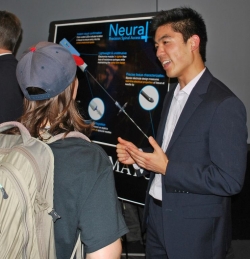“It is exceedingly rare for student medtech projects to become companies,” Rains said. “But in a very intentional way, and thanks to a robust local and regional medtech ecosystem, that is exactly what is happening here.”
Among the approximately 4 million births in the United States each year, 2.4 million of those mothers elect to receive an epidural. Alarmingly 1 in 8 of those experience some complication – post-event headaches, chronic back pain, temporary paralysis or even death due to accidental misplacement and puncture of the spinal canal. Those complications are estimated to cost the healthcare system $200 million annually in direct and indirect costs.
The problem: placement and delivery of epidural needles are done entirely by feel without an available way to objectively determine when the needle has entered the epidural space versus other tissue types or the cerebrospinal fluid.
“My wife and I experienced first-hand the impact of an epidural misplacement complication during the birth of our son,” says T3 Labs Program Director Evan Goldberg. “The result was roughly 12 hours of extreme discomfort followed by an emergency C-section.”
A team of Georgia Tech students – Neuraline – aims to change that, reducing epidural delivery procedure time by as much as 50% while improving patient outcomes.
The team, assisted by James Rains, professor of practice with the Coulter Department of Biomedical Engineering at Georgia Tech, is developing a device that measures electrical impedance based on tissue type that alerts the anesthesiologist when the needle is in the proper location – the epidural space – for drug delivery. While novel, it is still compatible with existing needles and catheters.

Neuraline Co-Founder Cassidy Wang. Image credit: Georgia Tech Coulter Department of Biomedical Engineering.
“We are grateful to T3 Labs for providing access to the facilities and resources the team needed to be ready for our first ever preclinical session with a practicing anesthesiologist,” said Cassidy Wang, co-founder of Neuraline. “There we acquired the customer feedback and functional performance data needed to keep us moving forward efficiently on the complex pathway from concept to commercialization.”
According to Wang, the Neuraline team will enter Georgia Tech’s Startup Launch accelerator this summer where it will attempt to accomplish the necessary steps, including data acquisition, user input, design refinements and more to prepare for an FDA 510(k) application.
“It is exceedingly rare for student medtech projects to become companies,” Rains said. “But in a very intentional way, and thanks to a robust local and regional medtech ecosystem, that is exactly what is happening here.”
Neuraline worked with physicians at Mayo Clinic in Jacksonville to define the clinical need and develop their prototype. The collaboration is the beginning of an effort to connect students from the #1 biomedical engineering program with the #1 hospital system in the country.
Each year T3 Labs offers promising biomedical engineering students access to facilities and resources needed to advance their medtech projects. “For so many reasons we want to help the team succeed in solving a gaping unmet clinical need,” Goldberg said.
Contact T3 Labs at info@t3labs.org , and follow us on LinkedIn and Twitter.
